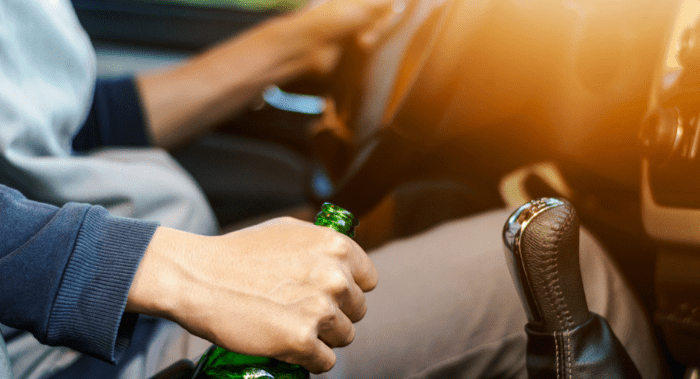Complete the form to schedule a free consultation with a traffic lawyer
4 Alcohol-Related Traffic Offenses and How to Fight Them

Drinking and driving don’t mix. Alcohol and other mood-altering substances can affect your perception, judgment, and reflexes. If you decide to drink and drive, you’ll be lucky to get stopped before you cause an accident.
Unfortunately, drunk driving leads to thousands of crashes every year. In 2020, drunk drivers caused over 10,500 crashes in the United States, killing more than 11,600 people.
If you include buzzed driving, where drivers had alcohol in their systems but were not over the legal limit, alcohol-related crashes killed nearly 13,700 in 2021.
States have many criminal offenses on the books to deter and punish intoxicated driving, as well as related offenses prosecutors can use to punish specific outcomes from drunk driving, such as injuries and deaths.
Here are four alcohol-related traffic violations you should know about.
Arrests for Drunk Driving
Drunk driving arrests usually happen after officers observe you violating traffic laws or you cause a crash.
In most states, you give implied consent to drug or alcohol testing when you receive a driver’s license. This means officers must have a reason to pull you over. However, they don’t need a reason to ask you for a breath, urine, or blood sample.
If you cause a crash or violate traffic laws, the police could ask for a test on the spot. But in most cases, they’ll simply observe you and, if they detect any signs of intoxication, ask you to take a field sobriety test, breathalyzer test, or both.
They might also ask for a urine or blood test if they suspect you used drugs that won’t show up on a breath test.
Depending on the officers’ observations and the outcome of the tests, you could be arrested for violating the law. Some of the violations you could face include:
1. Driving Under the Influence
Driving under the influence (DUI) is the main offense prosecutors use to punish drunk or drugged drivers. States use many terms roughly equivalent to DUI, including:
- Driving while intoxicated (DWI)
- Operating while intoxicated (OWI)
- Operating a vehicle under the influence (OVI)
- Impaired driving
States give prosecutors two legal avenues by which to prove DUI or its equivalent: per se violations and impairment violations.
Per Se Violation
A per se DUI happens when your blood alcohol content (BAC) exceeds the legal limit for your state. The legal limit is 0.08% in every state except Utah, where it’s 0.05%.
Police can arrest you, and prosecutors can convict you, for having a BAC over the limit, even if you didn’t violate any traffic laws or cause a crash. In other words, you commit a per se DUI just by driving with a BAC over the limit.
Impairment Violation
An impairment DUI happens when alcohol or drugs impair your ability to drive. To give you an impairment violation, police officers must observe your impaired driving or have witnesses who did. Some observations that might support an impairment violation include:
- Erratic speed
- Weaving
- Failing to use signals
- Colliding with vehicles, objects, or parked cars
You can get an impairment violation regardless of your BAC. Thus, you commit an impairment DUI for causing a crash or violating traffic laws with any amount of alcohol in your system.
2. Open-Container
You might notice gaps between a per se DUI and an impairment DUI. Most states have lesser charges they can use to fill this gap.
Police can cite you under open-container laws if you have alcohol in the passenger compartment of your vehicle. In some states, you can’t even have an empty alcohol container inside your vehicle.
3. Vehicular Homicide
If someone dies in a crash you caused while intoxicated, police can arrest you for vehicular homicide. Typically, this means you drove recklessly and someone died as a result.
In most states, you could commit vehicular homicide even if you weren’t intoxicated. For example, killing someone while street racing could constitute vehicular homicide. Many states also specifically include drunk driving as a form of vehicular homicide.
4. Assault
Injuring someone through deliberate action constitutes assault. When you injure someone in a drunk driving crash, the choice to drive while intoxicated is viewed as a deliberate action that justifies an assault charge.
Some states consider a vehicle a type of weapon, meaning you could get charged with assault with a deadly weapon or aggravated assault. Some might also enhance the penalties if you cause an incapacitating injury.
Fighting Alcohol-Related Traffic Charges
Alcohol- and drug-related traffic charges can be difficult to beat because of the per se violations built into the laws. But for an impairment DUI, you could challenge the officers’ observations or the reasons for your impairments, such as a health event.
If you’re facing alcohol-related traffic charges, TicketVoid is in your corner. Fill out our quick online form or call 1-888-296-3059 for help finding a DUI lawyer near you.
Recent Posts
-
How to Explain Speeding in Court: Your Defense Strategy Guide
-
What's a Good Reason for Speeding? Legal Defenses That Work in Court
-
What Is the Best Excuse for a Speeding Ticket: Comprehensive Defense Strategies and Legal Options
-
What's the Best Plea for a Traffic Ticket? Your Defense Guide
-
How Do Lawyers Handle Traffic Tickets: Expert Defense Process Explained
